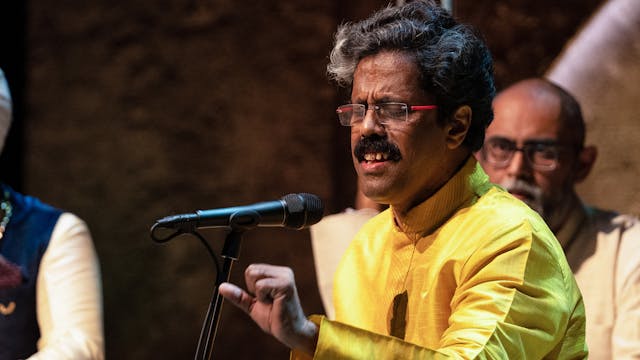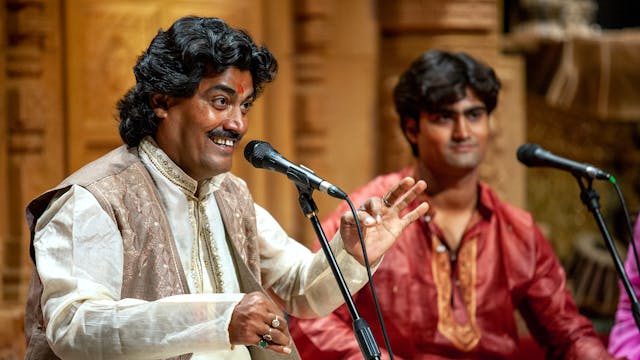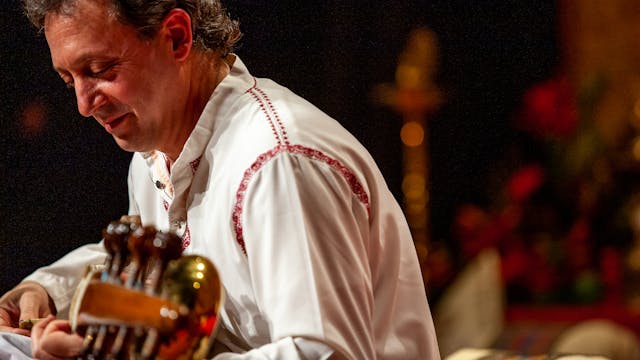Pandit Ronu Majumdar | Raag Shudh Sarang
Afternoon Ragas
•
29m
Recorded at Darbar Festival 2006, on 5th March, at the Peepul Centre, Leicester.
Musicians
- Pandit Ronu Majumdar (bamboo flute)
- Subhankar Banerjee (tabla)
- Gunwant Dhadyalla (tanpura)
Raag Shudh Sarang; Thaat: Kalyan; Samay: Late Morning
Raag Shudh Sarang is a derivative of the ‘Sarang’ family of ragas that reside in the cluster of afternoon ragas in the Hindustani system. Sarang itself was born out of the rustic folk melodies of India and hence, any sarang-raga is inevitably influenced by the unpretentious simplicity of folk.
In this video, Pandit Ronu Majumdar presents a madhyalay composition in Shudh Sarang. He is accompanied by Pandit Subhankar Banerjee on the tabla.
Pandit Majumdar wields the folksy elements of this raga without ruffling its august, classical texture. He performs super-fast taans (rapid notes) in one breath, flitting between octaves – a feat that can be achieved on a bamboo flute with mammoth patience and immersive practice.
He presents a second composition in this raga in drut Teental. Pandit Banerjee blends intuitive playing into this section, rendering radiance to the breathy and playful tonal sentences of Pandit Majumdar. The recital ends with a jhalla where long, standing notes and vibrato combine with graceful phrasing and virtuosic playing.
Though the name ‘Shudh Sarang’ suggests that this is the pure (shudh) version of Sarang, and, therefore, the oldest of this group of ragas, its history reveals that till early 20th century this raga did not enjoy a clear understanding and various musicians treated it differently. The most popular variety of the present era is discussed here. Shudh Sarang belongs to the Kalyan thaat. Its jati is audav-shadav, that is, it deploys five notes in its ascent and six notes in its descent. The vadi swar or dominant note is Re and the samvadi swar or sub-dominant note is Pa. It omits Ga completely and uses both shudh and teevra Ma (pure and sharp 4th). The rest are all pure notes.
Its arohana and avarhana are as follows:
S R m P N S’
S’ N D P M R S
Usually, ragas belonging to Sarang group are assigned to Kafi thaat; but Shudh Sarang, due to all it shuddh swaras in company with teevra madhyam (m) is very logically assigned to Kalyan thaat. Some musicians employ komal nishaad (n), some omit shuddh dhaivat (D) while some take the liberty of deploying both the madhyams chromatically, one after the other. This raga’s non-cumbersome, easy-going persona exudes peace.
Up Next in Afternoon Ragas
-
Waseem Ahmed Khan | Poorvi
Recorded at Darbar Festival 2021, on 23rd October, at Milton Court Concert Hall, the Barbican, London.
Musicians:
- Waseem Khan (khayal vocal)
- Gurdain Rayatt (tabla)
- Milind Kulkarni (harmonium)Raag Poorvi; Thaat: Poorvi; Samay: Late Afternoon
Enter the world of khayal through the velvety,...
-
Prem Kumar Mallick | Raag Bhimpalasi
Recorded at Darbar Festival 2007, at the Phoenix Theatre, Leicester.
Musicians:
- Pandit Prem Kumar Mallick (Darbanga dhrupad)
- Prashant Mallick (Darbanga dhrupad)
- Ravishankar Upadhyay (pakhawaj)
- Debipriya Das & Gunwant Dhadyalla (Tanpuras)Raag Bhimpalasi, Thaat: Kafi, Samay: Afternoo...
-
Ken Zuckerman | Bhimpalasi
Recorded at Darbar Festival 2007, on 15th April, at the phoenix Theatre, Leicester.
Musicians:
- Ken Zuckerman (sarod)
- Partha Sarathi Mukherjee (tabla)
- Debipriya Das (tanpura)Raag Bhimpalasi; Thaat: Kafi; Samay: Afternoon
Ken Zuckerman gives an immaculate rendition of Raag Bhimpalasi in t...



